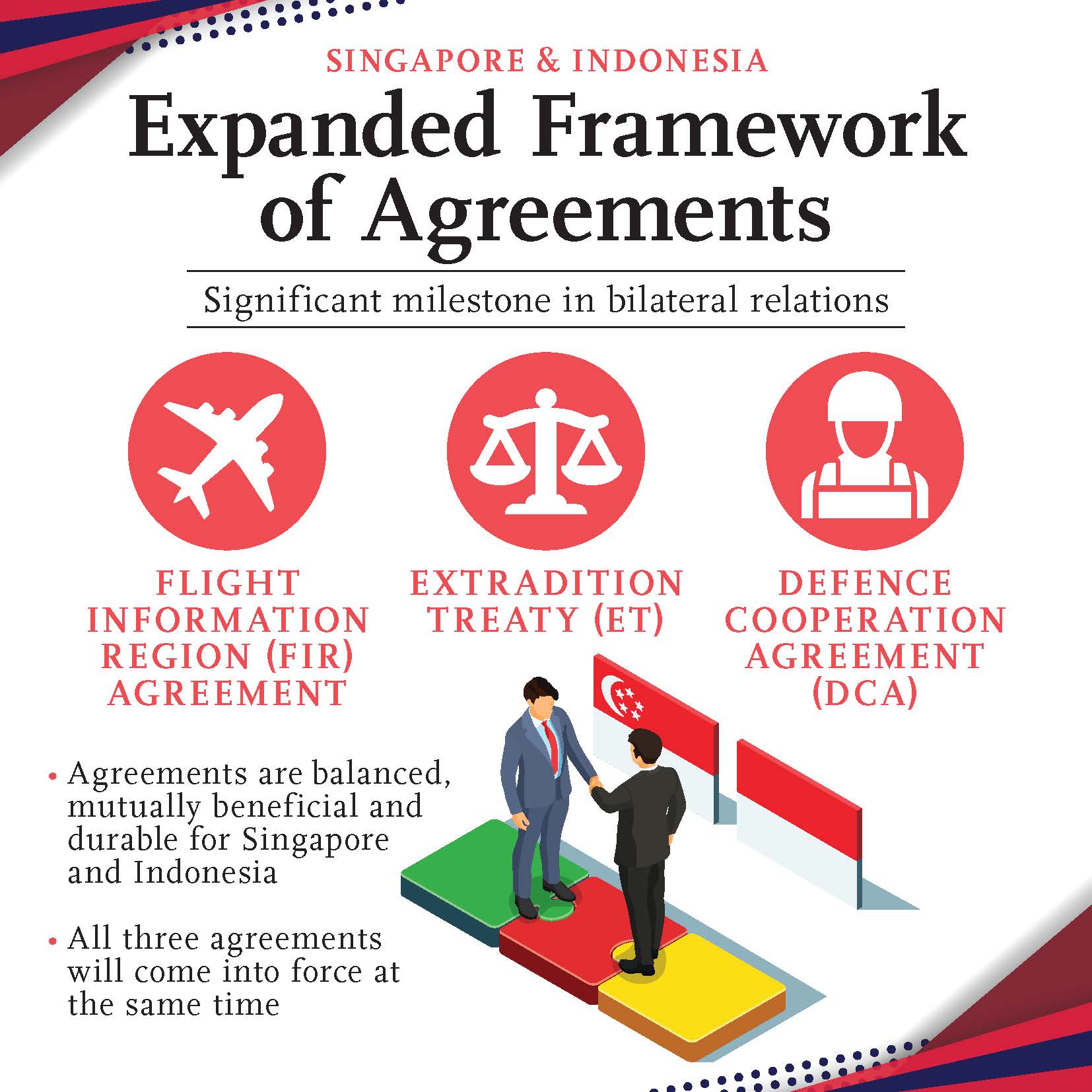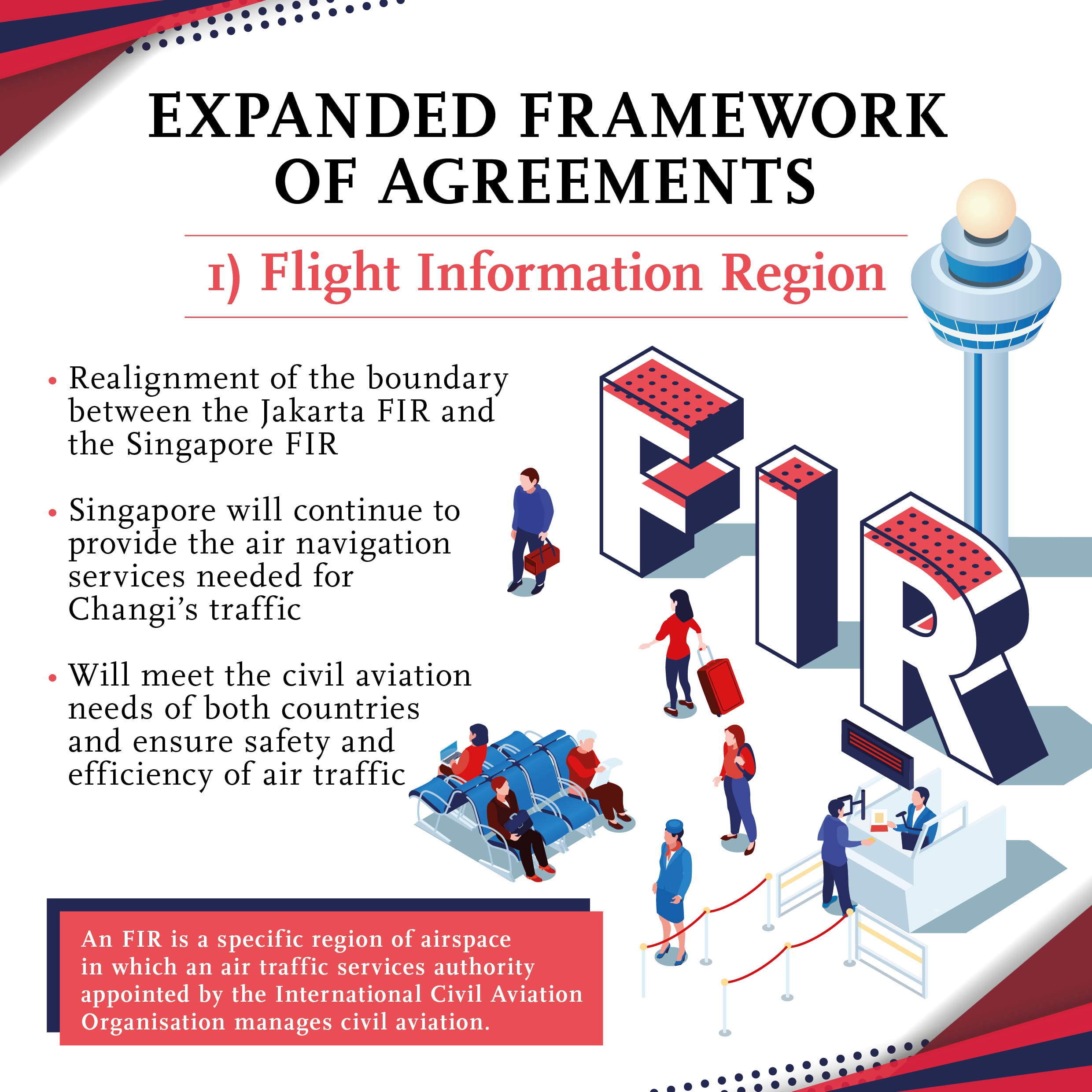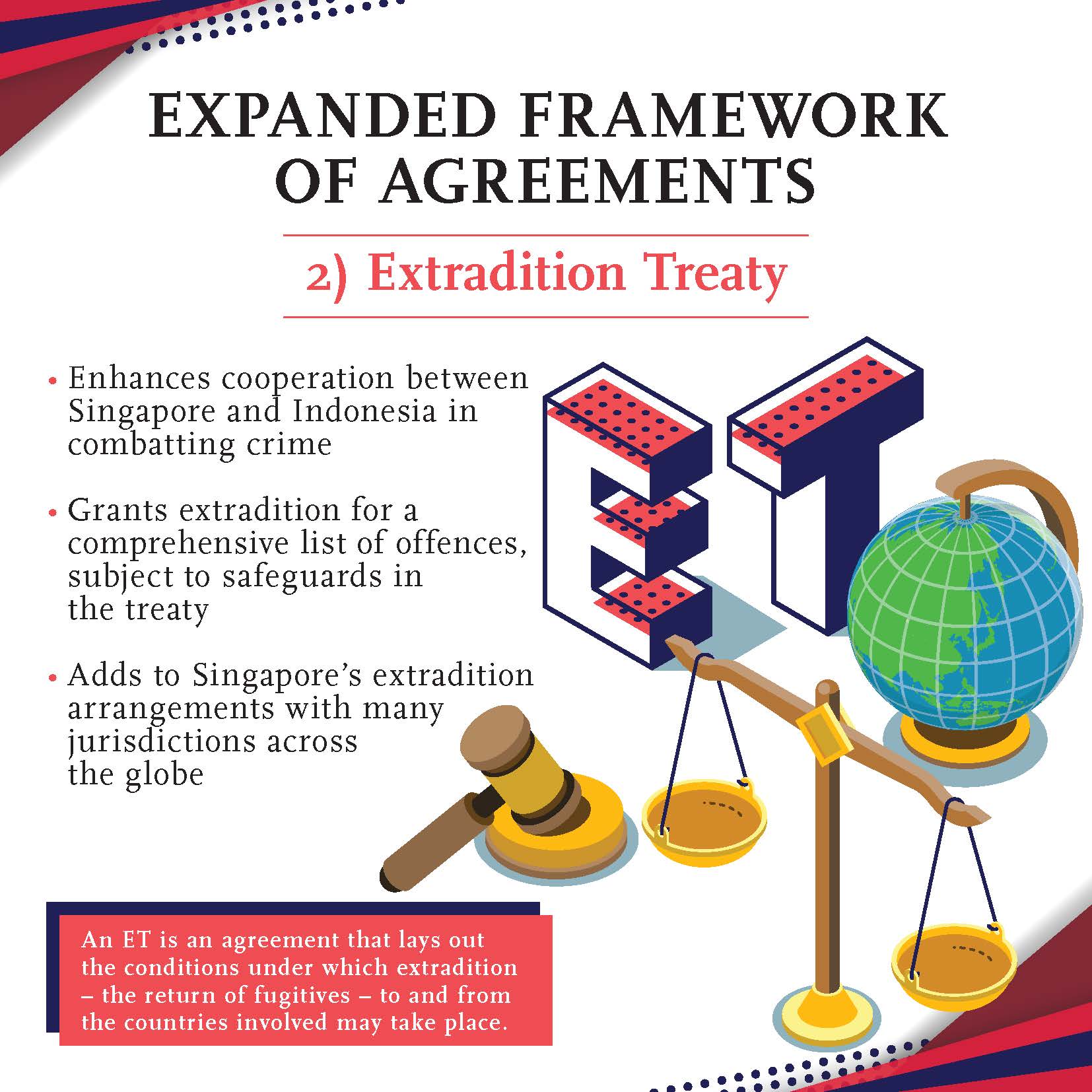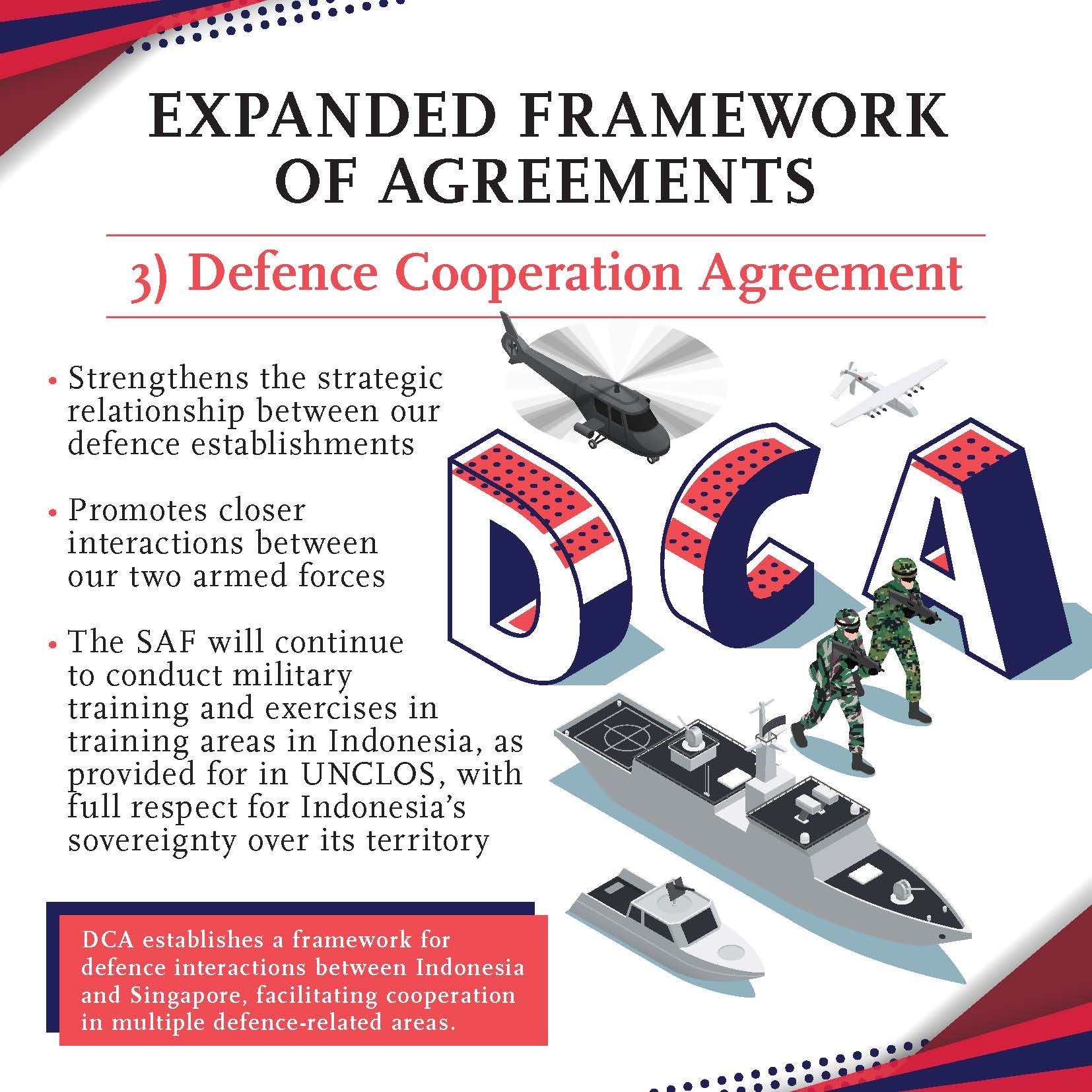SM Teo Chee Hean in Parliament on the Agreements under the Expanded Framework between Singapore and Indonesia
SM Teo Chee Hean
Foreign affairs
Parliament
Safety and security
14 February 2022
Transcript of Ministerial Statement by Senior Minister and Coordinating Minister for National Security Teo Chee Hean on the Agreements under the Expanded Framework between Singapore and Indonesia at the Parliament Sitting on 14 February 2022.
This article has been migrated from an earlier version of the site and may display formatting inconsistencies.

Mr Speaker Sir
Introduction
Prime Minister Lee Hsien Loong and Indonesian President Joko Widodo held their Leaders’ Retreat on 25 January 2022 in Bintan, Indonesia. This was our first Leaders’ Retreat since the start of COVID-19. It was also significant because the Leaders witnessed the signing by the respective Ministers of a set of agreements on three long-standing bilateral issues under an Expanded Framework.
These agreements are, first, an Agreement on the Realignment of the Boundary between the Jakarta Flight Information Region (or FIR) and the Singapore FIR; second, a Treaty for the Extradition of Fugitives (or ET); and third, a Joint Statement between the Defence Ministers on the 2007 Defence Cooperation Agreement (or DCA). My Indonesian counterpart Coordinating Minister for Maritime Affairs and Investments Luhut Pandjaitan and I also signed an Exchange of Letters in which our governments committed to bring these agreements into force simultaneously.
Following the Leaders’ Retreat, several Members have filed parliamentary questions, regarding the nature of the agreements and their impact on Singapore.
Minister Iswaran and I will address Questions for Oral Answer filed by several Members, namely, Mr Gan Thiam Poh, Ms Poh Li San, Mr Saktiandi Supaat, Mr Melvin Yong, Mr Lim Biow Chuan, Mr Pritam Singh and a Question for Written Answer filed by Miss Cheryl Chan from today’s Order Paper, as well as the Question filed by Mr Gerald Giam for a future sitting.
I will cover the principles upon which the Expanded Framework was negotiated, the main elements of the agreements, their implications for our bilateral relations, and the implementation of the agreements. Minister Iswaran will elaborate with further details on the FIR Agreement.
With your permission, Mr Speaker, may I please ask the Clerks to distribute an infographic on the agreements under the Expanded Framework for Members’ reference.
Principles of the Expanded Framework
The FIR, extradition, and military training issues have been on our bilateral agenda for several decades. I had been personally involved in handling some of these issues at various points in time during my previous career in the SAF and subsequently as a Cabinet Minister.
Over the years, we have been working with successive Indonesian governments to resolve these issues. We first signed agreements on the FIR and military training 27 years ago in 1995, but the FIR agreement could not be implemented due to external factors in the process of submitting it for approval by the International Civil Aviation Organization (or ICAO). The 1995 military training agreement was implemented but lapsed after a few years.
In 2007, we made another attempt and concluded agreements on the DCA and ET and agreed to implement them simultaneously. However, the agreements were not ratified by Indonesia.
In 2019, President Jokowi was elected to a second term. PM Lee and President Jokowi enjoy a good relationship and our two countries and governments have strong ties. Both leaders were of the view that the conditions were right to discuss and resolve the outstanding issues decisively, in an open, constructive, and mutually beneficial manner.
PM Lee and President Jokowi tasked me and Coordinating Minister Luhut, whom I know well, to put maximum effort into this. We worked out a Framework for Discussions as a basis for our two governments to discuss the FIR and Singapore’s military training in the South China Sea. This Framework was endorsed by PM Lee and President Jokowi at the previous Leaders’ Retreat in October 2019 to resolve these two issues separately but concurrently.
The Framework laid out a set of considerations and principles, and acknowledged that the core interests and rights of both countries must be recognised and respected.
In the course of the negotiations, in April 2021, at Indonesia’s request, we expanded this Framework to include the ET. Our two countries have worked together on this issue before. It was in our interests to reach an agreement on the extradition of fugitives that would strengthen our bilateral cooperation in tackling criminal matters. The inclusion of the ET would help conclude a set of agreements on these three outstanding issues that would be acceptable to both sides.
The set of agreements under the Expanded Framework for Discussions was carefully negotiated to achieve a good balance of benefits for both sides which are durable and for the long haul. It is underpinned by full respect for the sovereignty of both countries. It is in accordance with international law, in particular the United Nations Convention on the Law of the Sea (or UNCLOS), and protects our mutual interests.
At the Leaders’ Retreat, both governments also exchanged letters undertaking to bring the three agreements that we have reached – on the FIR, Extradition, and Defence Cooperation – into force simultaneously.
Main Elements of the Agreements
Let me now touch on each of the agreements.
FIR Agreement
FIR arrangements are established under ICAO for the purpose of managing civil aircraft in order to ensure the safety and efficiency of air traffic and to advance international civil aviation. Members would be aware that Indonesia had expressed its desire to realign the FIR boundaries in accordance with its expanded territorial waters which include archipelagic waters newly provided for under UNCLOS in 1982. Singapore’s interest was the present and future needs of Changi Airport, which Indonesia accepted.
The FIR Agreement that we concluded under our Expanded Framework addressed these key considerations. Singapore and Indonesia agreed to realign the boundary between the Singapore and Jakarta FIRs, largely taking into account Indonesia’s archipelagic and territorial baselines, which were deposited with the UN in 2009.
Indonesia will also delegate to Singapore the provision of air navigation services in portions of the airspace within the realigned Jakarta FIR, to ensure that present and future traffic to Changi Airport and nearby Indonesian airports continue to be managed safely and efficiently.
The delegation arrangement will last for 25 years, and shall be extended by mutual consent if both countries find it beneficial to do so.
When all the agreements under the Expanded Framework have been ratified through our respective domestic processes, Singapore and Indonesia will jointly seek ICAO’s approval for these new FIR arrangements.
We believe that the FIR arrangements will benefit the aviation sectors of both countries and airspace users in the region.
Minister Iswaran will elaborate further on the specifics of the agreement in his Ministerial Statement.
DCA
On military training, the Singapore and Indonesian governments agreed to ratify and bring into force the DCA and the Implementing Arrangement between the SAF and the Indonesian Armed Forces for the Military Training Area in Indonesia – both agreements as signed in 2007.
Our two defence establishments have enjoyed decades of close friendship. As common security challenges become more complex, we need to work together closely all the more. The DCA will strengthen cooperation between our armed forces and advance our bilateral defence relations. It will facilitate the discussion and oversight of new areas of defence cooperation between our two defence establishments.
The SAF has been conducting its training in the designated South China Sea Danger Area (or SCSDA for short) since the 1960s, when the area was international waters. Subsequently, parts of the SCSDA became Indonesian archipelagic and territorial waters and airspace under UNCLOS. However, the SAF’s training activities in such areas continue, as a right provided for under Article 51 of UNCLOS.
When the DCA comes into force, it will provide clarity on the arrangements for the SAF’s training in Indonesian archipelagic and territorial waters and airspace, with full respect for Indonesia’s sovereignty over its territory, while preserving Singapore’s rights.
ET
The third agreement we signed was the Extradition Treaty. Under the ET, Singapore and Indonesia will grant extradition for a comprehensive list of extraditable offences covered by the treaty, in accordance with the laws of both countries and subject to the requisite safeguards and provisions in the ET.
The ET is substantively similar to the treaty that we had signed in 2007. The only change is in its retrospective application to extradite fugitives for crimes committed 18 years ago, as compared to 15 years in the 2007 agreement, starting from the time that the ET comes into force. This change was made at Indonesia’s request. We believe that the extension will provide more flexibility in the scope of cooperation for both countries.
The benefits of the ET to both countries are clear. It will strengthen cooperation between our law enforcement agencies in combatting crime. Our hope is that the ET will also be helpful to Indonesia’s own efforts to prevent suspected criminals from fleeing overseas, and for them to be apprehended in Indonesia.
Even without an ET, we already work closely with Indonesia to tackle these criminal matters. The ET will complement our existing cooperation with Indonesia through the ASEAN Treaty on Mutual Legal Assistance in Criminal Matters (ASEAN MLAT) and other multilateral treaties we are party to.
It also adds to Singapore’s extradition arrangements with many jurisdictions across the globe.
More fundamentally, the ET reflects both countries’ commitment to work with international partners to combat crime and uphold the rule of law. This will help to enhance Singapore’s role as a responsible and effective member of the international community, with a positive impact on our already good standing and reputation as a global financial hub.
Next Steps
Mr Speaker, I have covered in some detail the scope of the agreements under the Expanded Framework to help Members of this House better understand how the conclusion of this set of agreements is a significant milestone for Singapore-Indonesia relations and is beneficial to both countries.
We have had negotiations on these issues since the 1990s. Singapore has always approached these discussions with our close neighbour Indonesia with sincerity and in the spirit of cooperation. We strive to reach a balance of benefits, taking into account each other’s rights and interests. This was our approach in 1995 and in 2007, when we had previously reached agreement on these issues; though the agreements had subsequently either lapsed or could not be implemented for reasons beyond our control.
We have maintained this same spirit and approach through the years. The negotiations to arrive at this set of agreements under the Expanded Framework involved many rounds of negotiations since 2019, made even more challenging by the fact that most of the negotiations were carried out during the COVID-19 period. Our negotiators spent many weeks in quarantine as a result of that and we had many Zoom meetings. We were able to reach agreement between PM Lee and President Jokowi because both had a strong desire to resolve these issues decisively and amicably, based on the Framework they endorsed. This set of agreements represents a win-win outcome. They are balanced, mutually beneficial and durable agreements for the long haul. They will provide a strong foundation to further strengthen our bilateral relations.
Both sides are currently going through their respective domestic processes to ratify these agreements. Both PM Lee and President Jokowi have expressed the desire to ratify and bring these agreements into force simultaneously soon.
Mr Saktiandi Supaat and Mr Pritam Singh asked what will happen at the end of the 25-year duration of the FIR Agreement.
I should first say that the duration of this FIR Agreement, 25 years, will provide a durable and firm basis for cooperation in this important area for a generation or more. The focus of both sides now is to implement this set of agreements by bringing all of them through our respective domestic processes, and in the case of the FIR, subsequently to ICAO.
This agreement shall remain in force for 25 years and shall be extended by mutual consent if both countries find it beneficial to do so.
Singapore and Indonesia recognise that we will always be neighbours, and that we should continue to work together as partners. This agreement and the principles underlying it provide a good basis for future cooperation where each side brings something to the table and we work together to create a larger outcome, where the whole is bigger than the sum of all its parts. We certainly hope and have confidence that after 25 years, this same spirit will prevail.
We had a capable and cohesive negotiating team who identified our interests clearly and pushed for them energetically and diplomatically. We have capable and committed negotiating partners too on the Indonesian side who also worked very hard to push for their interests. But both sides also knew that we had a shared interest in closer bilateral cooperation and the benefits that would bring. As a result we were able to reach a good set of agreements that are win-win.
The most important factor to ensure that Singapore always has a good hand to bring to the table in any negotiations, is to have a strong, clear thinking, trustworthy and capable government which is supported by a united people. It is this trust and unity of our people behind us that allow us to conduct negotiations with consistency and confidence. This provides the foundation for building good relations and creates a conducive environment for negotiations, so that we can arrive at a good outcome.
Conclusion
Mr Speaker, in closing this Statement, it has been my honour and privilege to work with our Indonesian counterparts, and witness our bilateral relations strengthen over many years from the 1970s onwards. It gives me particular satisfaction to have played some part in this latest chapter in our long-standing cooperation. The signing of this set of agreements and our ability to resolve longstanding and complex bilateral issues in an open and constructive manner demonstrate the strength and maturity of our bilateral relations.
I would like to thank my counterpart Coordinating Minister Luhut and the teams of Ministers and officials involved on both sides who have worked hard to attain the best results in the best interests of both countries. I am confident that when implemented, these agreements will create opportunities for even closer collaboration in civil aviation, criminal matters, and defence cooperation, and also pave the way for us to advance our bilateral relations with Indonesia with friendship, mutual trust, and confidence.
Thank you very much.
* * * * *




Explore related topics
